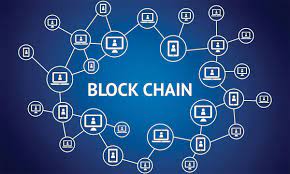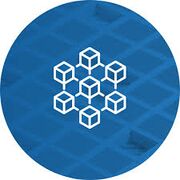Différences entre versions de « Blockchain Technology »
| Ligne 114 : | Ligne 114 : | ||
== {{Widget:Definition-graphique-Fiche}} == | == {{Widget:Definition-graphique-Fiche}} == | ||
| − | {{@}} [https:// | + | {{@}} [https://cmapscloud.ihmc.us/viewer/cmap/1Y37YT7YG-1RMVNLT-9KHFFT Carte conceptuelle sur la Blockchain] |
<!-- ************************* Début ****************************** --> | <!-- ************************* Début ****************************** --> | ||
{{Fiche Didactique Media <!-------------------------------------------> | {{Fiche Didactique Media <!-------------------------------------------> | ||
Version actuelle datée du 3 juin 2022 à 11:49
 Traduction
Traduction
Blockchain Technology (Anglais) / Technologie de la chaîne de blocs (Français) / تقنية Blockchain (Arabe)
/ Tecnología de cadena de bloques (Espagnol) / Tecnologia Blockchain (Italian) / Blockchain-Technologie (German)
/ ブロックチェーンテクノロジー (Japonnais)
/ 区块链技术 (Chinois)
 Définition
Définition
Domaine, Discipline, Thématique
Définition écrite
- Blockchain
• Blockchains are distributed digital ledgers of cryptographically signed transactions that are grouped into “blocks”
• Each block is “cryptographically” linked to the previous one after validation and undergoing a “consensus” decision
• As new blocks are added, older blocks become more difficult to modify
• New blocks are replicated across all copies of the ledger within the network, and any conflicts are resolved automatically using established rules
• Bitcoin is the world’s premier blockchain • Launched in 2009 by an anonymous person (or a group of persons) known by the name of Satoshi Nakamoto • Suspiciously around the time of the Subprime crisis • First successful peer-to-peer electronic cash system • Bitcoin illustrates how we use blockchain to maintain a history of valid transactions that are tamper-resistant, without any effort from central authority
• Homogeneous •Easier to design, operate, and maintain • Single point of control & authority • Multiple users share same set of resources • Single point of failure (- Honest, - Malicious)
• A group of independent systems (nodes) working together for a purpose • Connected & communicate to each other via a network • Each operates concurrently • Can continue correct operations even if some nodes fail |
Définition graphique
![]() Carte conceptuelle sur la Blockchain
Carte conceptuelle sur la Blockchain
 Concepts ou notions associés
Concepts ou notions associés
 Exemples, applications, utilisations
Exemples, applications, utilisations
• Performance • Scalability • Redundancy (for fault-tolerance) • How to ensure consistency among nodes of a distributed system? • Even if some aren’t reliable nor honest? • Trust without trust? • Requires a way to reach “consensus”
• For a centralized database system, one central entity handles all requests and data processing • Data updates simple and quick • Cheaper to manage and maintain • Performance bottleneck under high concurrent requests • Single point of failure
• A group of databases cooperating together to provide single data view to users • Fault-tolerant • Handle more concurrent load • Requires “trust” among nodes (• Not a problem if owned by a single enterprise, • For nodes not fully trusting each other, a “consensus” protocol is required to keep a consistent view of data)
• A type of distributed database system • Immutable, append-only database of transactions (for example, exchanges of assets or data) • Ledgers are replicated, synchronized and shared across all nodes in the distributed, peer-to-peer network • Nodes reach consensus on transaction updates to its own copy of ledger, thus maintaining consistent ledger state • Via consensus protocol, this is achievable without central authority or trusted 3rd party mediator |
 Erreurs ou confusions éventuelles
Erreurs ou confusions éventuelles
- Confusion entre blockchain - bitcoin
- Confusion entre public key - private key
- Confusion entre Cryptographic hash - cryptography
- Erreur fréquente: blockchain is a database
 Questions possibles
Questions possibles
 Liaisons enseignements et programmes
Liaisons enseignements et programmes
Idées ou Réflexions liées à son enseignement
- Overview of everything
- Centralized and distributed systems
- Bitcoin: a distributed ledger of payments in crypto-currency
- Identity
- Transaction
- Distributed Ledger in Bitcoin Network
- Trustless Consensus
- Blockchain 2.0 : Beyond cryptocurrencies
- Adapting blockchain technologies for the real world
- Enterprise blockchain platforms
- Selected applications
- Limitations
- Bitcoin Mechanics
- BTC: Notable history
- BTC: Identity
- BTC: Distributed Ledger - Blockchain
- BTC transactions
- BTC wallets
- Mining mechanism and incentives, mining pool strategies
- Possible attacks on the Bitcoin network
- Try sending/receiving (fake) BTC on the testnet
Aides et astuces
Education: Autres liens, sites ou portails
 Bibliographie
Bibliographie
Pour citer cette page: (Technology)
ABROUGUI, M & al, 2022. Blockchain Technology. In Didaquest [en ligne]. <http:www.didaquest.org/wiki/Blockchain_Technology>, consulté le 21, novembre, 2024
- ..................
- ..................
- ..................
- ..................
- Sponsors Education
- Blockchain Technology (Concepts)
- Centralized Systems (Concepts)
- Distributed Systems (Concepts)
- Distributed Ledger Technology (DLT) (Concepts)
- Distributed Ledger in Bitcoin Network (Concepts)
- Bitcoin (Concepts)
- Ethereum (Concepts)
- Non-Public Blockchains (Concepts)
- Big Consortia (Concepts)
- Blockchain Technology
- Bitcoin Mechanics
- Ethereum
- PoW vs PoS consensus
- Consensus models
- Enterprise Blockchain
- Blockchain Scaling
- Stablecoins
- Concepts
- Fiche conceptuelle didactique





